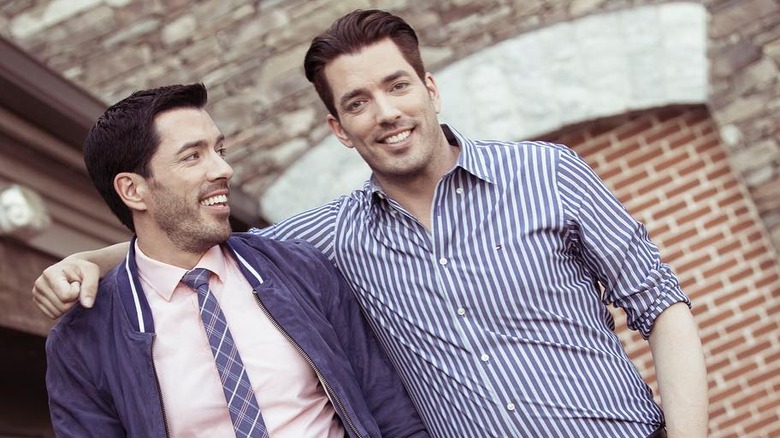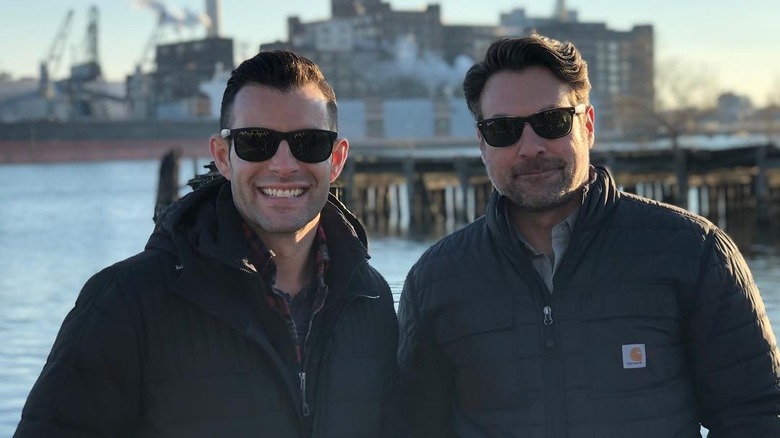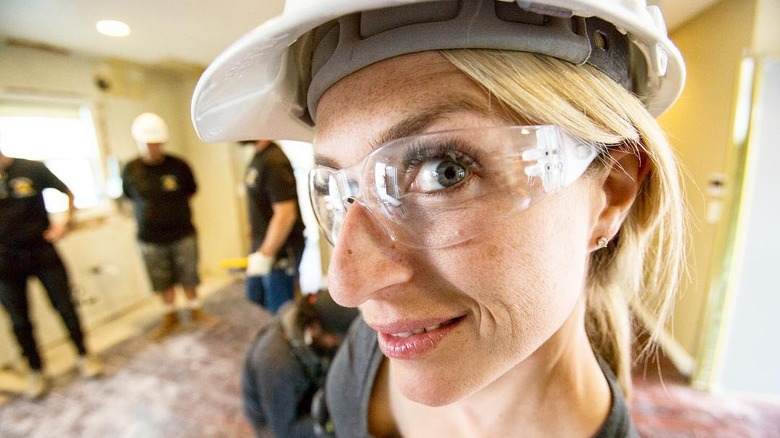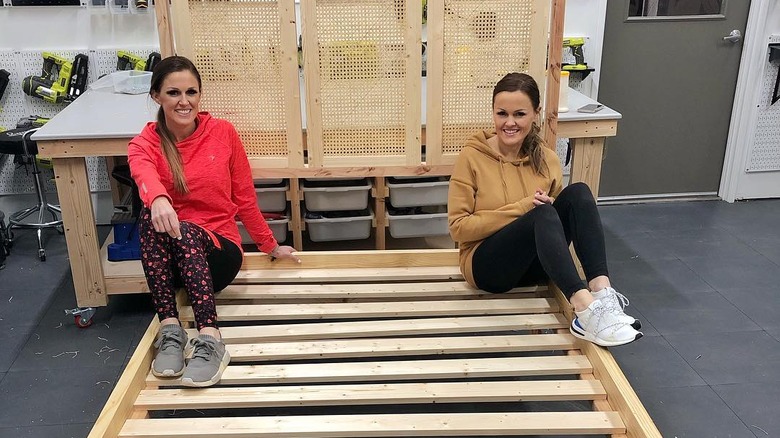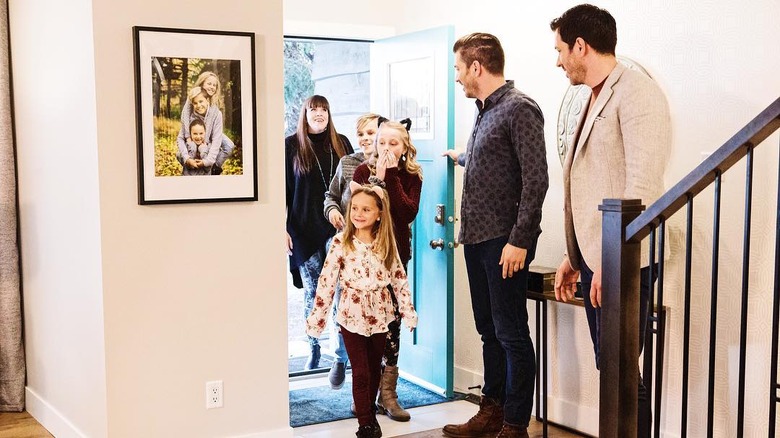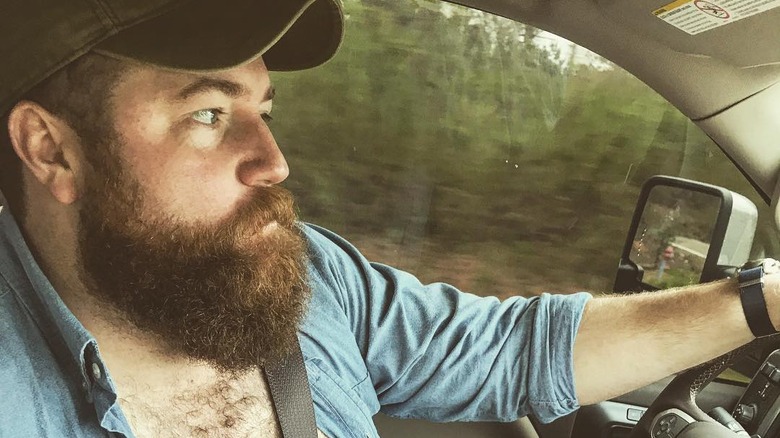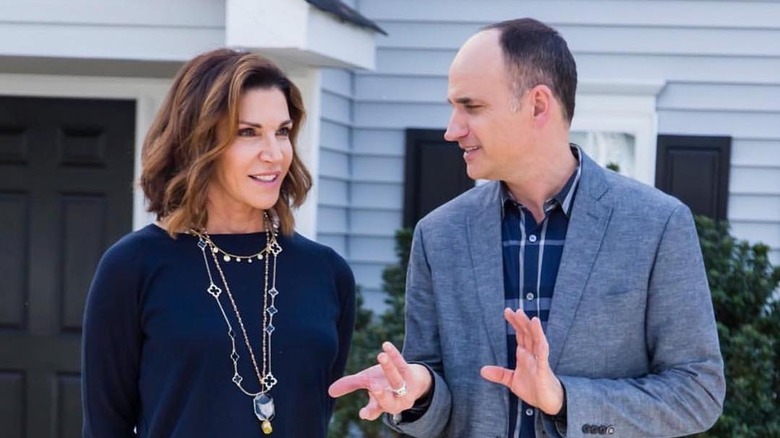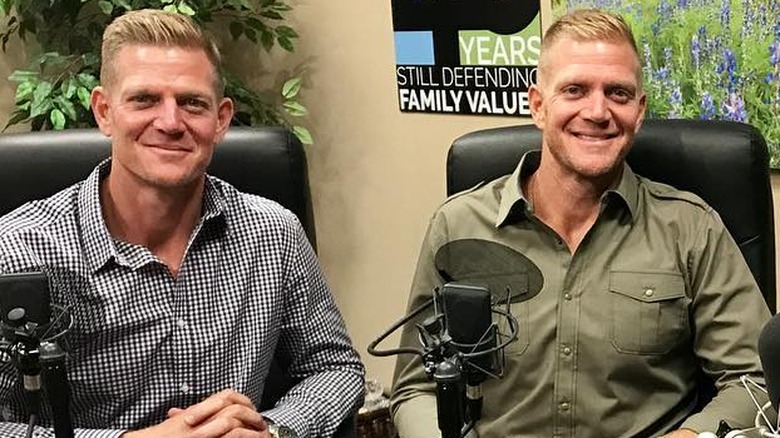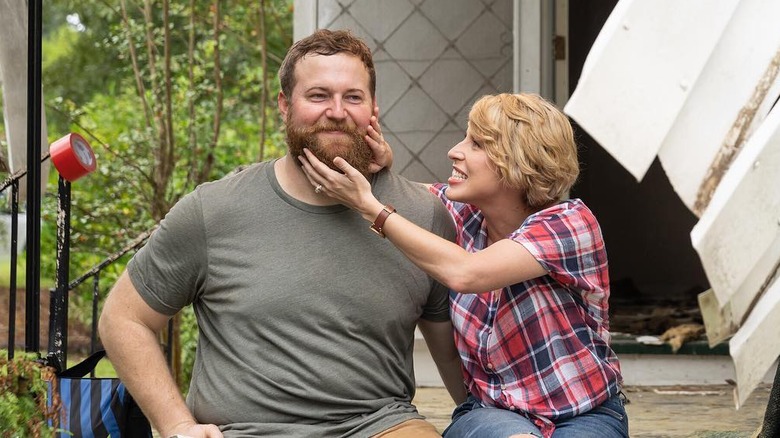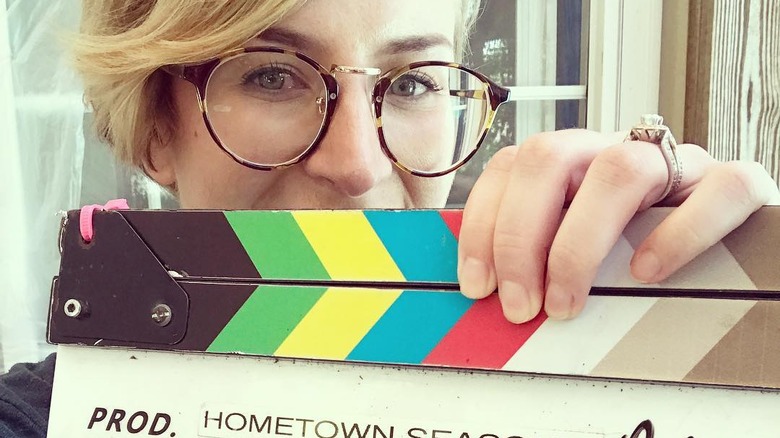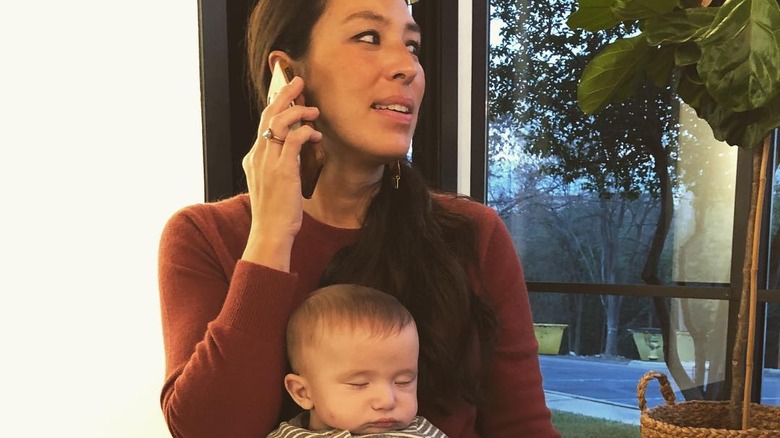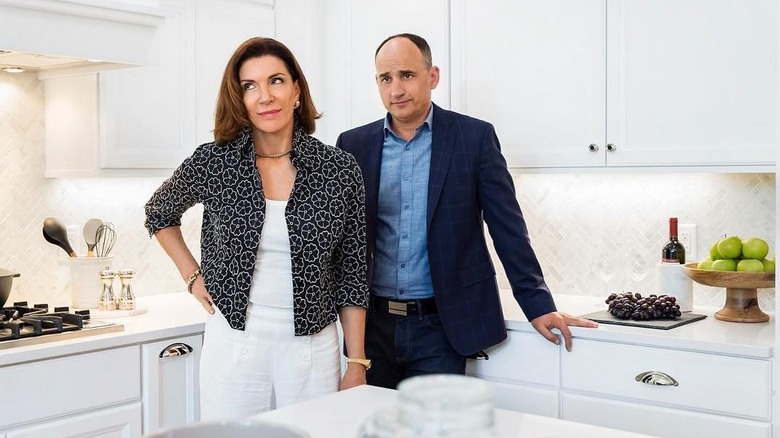Rules HGTV Hosts Are Forced To Follow
When it comes to the home improvement game, HGTV is an absolute juggernaut. According to Variety, the cable network hits 96 million homes each month, ranking number one among home-owning, college-educated women (and men). Shows like Fixer Upper and Property Brothers have done more than put the network on the map. They've brought HGTV stars into the homes of millions and turned them into household names.
While people like Drew and Jonathan Scott have become home renovation gurus — both on the small screen as well as in their everyday businesses — becoming an HGTV host isn't as easy as it may seem. In the HGTV article "13 Things You Didn't Know About HGTV's Property Brothers," the network explains that the Scott brothers spent years flipping houses and taking gigs as extras before they were actually discovered. And maintaining a position as a host is harder than it looks, too. These are the rules that all HGTV hosts need to follow.
Maintain a social following
Twitter and Instagram aren't just social networks used to share everyday experiences — at least not as far as HGTV hosts are concerned. In fact, many of the hosts on the network got their start because of their use of social platforms, particularly Instagram. According to Southern Living, "Instagram lets producers filter through up-and-coming designers and renovators by giving them a clear idea of their design sensibility and good taste." It's how Home Town's Ben and Erin Napier got their big break.
For Property Brothers hosts Drew and Jonathan Scott, that Instagram following is in the millions. Both brothers boast over 2 million followers each at the time of writing. Former Fixer Upper stars Chip and Joanna Gaines have amassed Instagram followings at 5 million and 13 million, respectively.
More than that, social platforms are a means to give show viewers a glimpse into the personal and professional lives of the hosts they watch on the regular. Fans get an inside look into public appearances, renovations and designs, and behind-the-scenes action. All of that, in turn, keeps them coming back to the shows that have made their favorite home improvement celebrities famous.
Be yourself on camera
It's one thing to post daily photos and tweets on social media platforms that show the world who you are. It's another to be able to convey that same authenticity on camera, and not everyone can actually do it. HGTV expects their stars to come across as authentic — and that's actually more important to execs than knowing your way around a set.
In an interview with House Beautiful, Kitchen Cousins and Cousins on Call star John Colaneri said, "It took some adjustment, but the best advice we ever received was during our first pilot. Our showrunner, who's one of our good friends to this day, knew we knew nothing. He stopped and told us, when it comes to talking to cameras and body positioning, we'll work [at] all that stuff. All I want is you to be you. We took that mantra through all of our shows."
In order to get more comfortable with the camera, Colaneri started recording himself before he ever submitted a sizzle reel to HGTV. He explains how the more practice he got, the easier it became to feel comfortable on camera.
Have a good personality
It isn't enough to be yourself on camera if "yourself" is completely unlikeable. HGTV producers are always looking for new talent to fill their series rosters, but not everyone is going to be the next Chip and Joanna Gaines. Hidden Potential star Jasmine Roth was discovered — sort of by accident — via her Instagram, but she revealed in an interview with House Beautiful that she still had to submit a sizzle reel to the company to see if she'd fit in.
HGTV has an entire site dedicated to series casting, so long as you have the right kind of personality. According to one series casting call, "Ideal candidates are outgoing, energetic, [and] creative." Bottom line: the network wants its featured guests and hosts to be likeable and watchable, but most importantly, they should be able to bring in the type of viewership that will continue to keep the network among the top 10 in the country.
You have to actually be in the business
More than anything, HGTV is looking for actual experts to lead their TV series lineup. As charismatic and appealing as someone might be on screen, it means little to nothing if they don't actually know what they're doing. And viewers are tuning in for real information. Whitney Gainer and Ashley Turner, the stars of Open Concept, had a long-running blog called Shanty2Chic before they ever appeared on HGTV. And the duo had been building homes for eight years prior to being discovered by the network.
They explained to Country Living how much they loved repurposing old pieces but had to figure out how to do so with a limited amount of money. "We started documenting our projects along the way on our blog to help others do the same in their homes," Gainer says. "That led to a love of tools, and furniture design." The duo shared their how-to designs on their blog, which just so happened to catch one producer's eye. "She discovered us there, and asked if we had ever considered doing a show."
You have to be someone viewers trust
HGTV has built their entire brand on creating shows that follow a "Three I's" formula. Ken Lowe, network chairman and president and CEO of Scripps Networks Interactive, explained to Variety that this means: ideas, information, and inspiration. The people who act as the faces of the network need to embody these ideals, and they're chosen specifically because of their expertise.
Kathleen Finch, president of HGTV, also told Variety, "That's one of the reasons that, as a brand, HGTV's been so successful. We're known for our expertise and the quality of our information. We've spawned a magazine. We've got home products. We've built an industry around the validity of our brand, and part of that is because we're such sticklers when it comes to the people we put on TV to represent the network."
So hosts like Drew and Jonathan Scott are appealing to producers because they've been in the home improvement industry for over 20 years. And fans of their shows can immediately feel comfortable, knowing the Scotts are coming from a place of know-how and ability.
Make things approachable for the average viewer
Not everyone who watches HGTV is in the home improvement industry. In fact, Yahoo! Finance reported that much of the network's viewership comes from people who don't actually own homes, but would one day like to. For many renters, the network is a part of a reality that they someday hope to achieve, and its hosts make that future feel absolutely attainable.
In an interview with The Washington Post, Allison Page, general manager of domestic programming and development for Scripps Networks, says HGTV looks for "vulnerability and realness" in its hosts. It tends to focus on affordable areas and down-to-earth renovators, people who viewers can see themselves in, as opposed to those who work in the multi-million dollar real estate industry.
For example, Ben and Erin Napier, the husband and wife team of HGTV's Home Town, work in Mississippi, where an entire project — house sale and renovation — costs about $200,000. Ben spoke with The Washington Post and explained that the town they film in, Laurel, has "seen some hard times." It's a reality that many Americans are living these days, so seeing a couple on TV make a real effort to improve a place like Laurel is encouraging for many viewers.
You have to work with HGTV partnerships
In 2017, Chip and Joanna Gaines spoke with People regarding their decision to end their wildly popular series Fixer Upper, citing their desire to spend more time with their family as the reason behind the decision. But according to a source who works with Scripps Networks, it had more to do with their inability to use their own brand of products on the show.
The source spoke with Vanity Fair and said, "They kept insisting on showing things with the Magnolia label, even though Scripps does not have a partnership with them on that stuff. This isn't how business is done with Scripps. You have to come to some arrangement if you want to show your products on your HGTV show." According to Country Living, the Gaines' brand — including their Magnolia furniture line — has made them worth millions. So it seems plausible that their inability to come to a partnership deal with Scripps may have contributed to their decision to leave the network.
You can't do anything without the network's permission
HGTV isn't the only network under the Scripps Networks umbrella — Food Network is a part of the company as well. And back in the day, when Rachael Ray began her career with the network, Scripps had no idea that she would wind up making the kind of money she did off of her partnerships outside of it. According to an HGTV source who spoke with Page Six, as a result of her success, Scripps created a talent contract that would prevent another Rachael Ray situation from happening again.
The source said, "Scripps talent contracts are very restrictive." Everything a host does has to be approved by the company beforehand, including any and all appearances, endorsements, and product deals. What's more, hosts are also required to give a huge percentage of their earnings back to Scripps, and so they wind up having very little control over the money they do make.
Be careful what you say
As is typical with any big company, part of working for Scripps Networks (and HGTV) is learning to keep quiet when it comes to the inner goings-on of its series. Scripps employs a pretty standard confidentiality agreement – for anyone who appears on the network – as part of their casting contract. It's not totally clear if this particular contract is for contestants, hosts, or both, but the document reveals HGTV's rigorous expectations.
Not only do applicants enter into a contract with HGTV that renders them exclusive to the network (meaning no public appearances or commercial work without the network's "express written permission"), but they also can't discuss specific details regarding the shows they appear on. Hooked on Houses's interview with a former contestant from Love It or List It confirmed that the confidentiality agreement goes for contestants, too.
Erin Napier spoke with Hooked on Houses in a separate interview and explained how she and her husband, Ben, were expected to wear a mic at all times while filming Home Town. According to the Scripps casting contract, any video or audio footage obtained can be used however the network sees fit. This allows for producers to be able to edit the footage in whatever way they choose to.
Don't be controversial
In an interview with Variety, Allison Page, general manager of HGTV, said it's a network that thrives on being "aspirational, attainable and fun." Part of adhering to that standard is hiring hosts who will be able to embody that for its audience. Ideally, HGTV hosts should be people that regular folks at home can relate to. Controversial, polarizing opinions are quick to get cut from the lineup.
Back in 2014, twin brothers David and Jason Benham were set to star in the new series Flip It Forward, but HGTV canceled the show before it ever aired. According to Right Wing Watch, it's because at least one of the brothers shares his extremist views with their father, evangelical preacher Flip Benham. In 2012, David Benham led a prayer rally outside of the Democratic National Convention in Charlotte, North Carolina, where he spoke out against homosexuality. HGTV never commented on the decision to pull the series, outside of a tweet saying they wouldn't be moving forward.
Wardrobe is specific
There are certain industry wardrobe standards that are pretty commonly known. Don't wear green if you're going to be filming in front of a green screen, for example, is one of those things that just sort of makes sense. But for HGTV stars, wardrobe standards are much higher.
While filming the pilot for Home Town, Erin Napier explained to Hooked on Houses how she was told she wouldn't be able to wear "clothing with thin stripes or small check patterns," the reason being that on camera, those patterns can appear wavy, creating a sort of psychedelic effect. She and her husband, Ben, were also barred from wearing anything with words or logos on it, unless they had express permission from the business. But what's most surprising is that on-camera talent aren't allowed to wear white. Ever. "They attach tiny little microphones to your body that can show through white, and you look super washed out on TV," Napier explained.
Participation in 'on the fly' interviews is mandatory
If you've ever watched an HGTV show, you're totally familiar with the "on the fly" interview, even if you have no idea what it actually means. On the fly, or OTF, interviews are completely unscripted and done spur of the moment. Typically, when it comes to shows on HGTV, they'll happen immediately following a funny or dramatic renovation moment.
For Home Town's Ben and Erin Napier, having to do so many OTF interviews took some getting used to. When Erin spoke with Hooked on Houses about her and Ben's experience filming the pilot for their show Home Town, she said the couple had to do one after every scene they filmed. According to her, "There is nothing scripted about shows like ours and Fixer Upper — they asked us questions and we answered 'em on the spot."
She went on to talk about how the actual filming of OTF interviews is also incredibly specific. Because of the more than one foot height difference between her and Ben, she had to stand on a "half apple" crate so that they would fit together in frame.
You need to work incredibly long hours
At the end of the day, working as a television host means long hours, regardless of whether it's scripted or unscripted. Part of HGTV's casting contract includes the disclaimer that filming will last "10 to 12 hours or more" per day. Leslie Remy, owner and broker of real estate firm Astra Realty, appeared in an episode of House Hunters and felt the full brunt of HGTV's daunting filming schedule. She spoke with Guide Live and said, "We spent close to eight hours filming one house of the three homes the couple will see. It's a 30-minute show; that'll probably be less than 10 minutes on TV."
HGTV's biggest stars, Chip and Joanna Gaines, certainly experienced the worst of it. In an interview with People, the couple explained that a big part of their decision to leave the network had to do with the "grueling production schedule" and how little time they had to spend with their family. Of course, the Gaines family would go on to start their own network with Discovery with new series of their own, but maybe they have more control over their filming schedules now.
You have to go with the HGTV flow
HGTV is a business, and like any other business, its goal, ultimately, is to bring in viewers, advertisers, and cash flow. While none of its shows are scripted per se, it does have a reputation for framing events in a way that builds drama. Bobi Jensen appeared on an episode of House Hunters in which she and her family were told by producers that their reason for moving was "boring and overdone," and they were told to play a different, more interesting angle, according to Hooked on Houses.
One poster on Reddit relayed a story about their aunt and uncle, who appeared on Love It Or List It. According to them, the couple had to actually film both the "love it" and the "list it" endings, allowing for the show's producers to decide which ending would be better. HGTV hosts, as honest and real as they are, still have to answer to the network. And if the network thinks a particular angle is going to increase viewership, its hosts just have to go with it.
